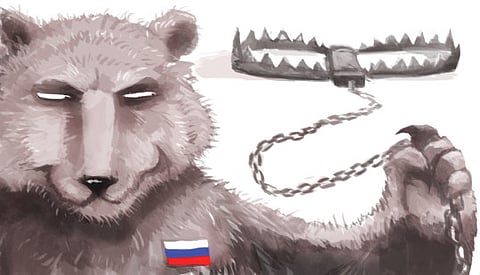Avoiding a new Cold War
Today’s Russia is a far cry from its Soviet predecessor

In the years since 9/11, it has become common in America to hear the occasional expression of nostalgia for the Cold War. The world may have suffered under the threat of nuclear annihilation, but at least one knew who one’s enemies were. The battle against Al Qaida, a shadowy group that often seems to be more of an ideology than an organisation, has always been far less cut-and-dried — and in some ways less emotionally satisfying. This may be why Russian President Vladimir Putin is such a figure of fascination for some Americans. It is not just his slightly comic penchant for being photographed doing ‘manly’ things (his manliness often underscored by his lack of a shirt). At an almost primal level, Putin is the kind of enemy Americans can easily understand — a real-life Bond villain who seems to delight in poking his finger in America’s eye.
The rapidly moving events in Ukraine add to this image the spectre of a Soviet leader from days gone by crushing an uprising in an unruly satellite state. Is Kiev 2014 all that different from Warsaw 1981, Prague 1968 or Budapest 1956? Let us accept, for the moment, the truth of this analogy. What then? Washington is no more likely to go to war over Ukraine now than it was over Poland, Czechoslovakia or Hungary all those years ago.
That does not, however, mean that nothing can or should be done. Back in 1991, one of the principles at stake in the Gulf War was the idea that big countries do not get to swallow small countries (or, in this case, chunks of smaller countries) just because the small country gets on their nerves. This is the point that the US Secretary of State, John Kerry, was making last Sunday when he went on one television programme after another to declare that Russia was addressing 21st century political problems in a 19th century manner. For Kerry and US President Barack Obama the good news is that the diplomatic toolbox contains many actions short of war, some of which could cause enough pain to make Russia understand that actions really do have consequences. The bad news, which Kerry surely knows but did not share with TV viewers, is that the easy moves have already been made. Several western countries have recalled their ambassadors from Moscow and more are sure to follow. The US and its allies have suspended their involvement in preparations for June’s G8 summit in Sochi. British Foreign Secretary William Hague was in Kiev last week. Kerry visited yesterday. Bank accounts can be frozen, travel bans may soon be imposed; beyond that, however, the choices become harder.
Moreover, Putin — for all his bluster a calculating, rational actor in international affairs — probably anticipated all of these western moves before ordering military action in Ukraine. He will also be well aware that what he is doing there is far more serious than his military intervention in Georgia in 2008, but probably assumes that the very complexity of the situation works in his favour.
For the international community, the danger is that if the occupation — and potentially the dismemberment — of Ukraine is allowed to stand, an ominous precedent will have been set. Many pieces of the former Soviet empire contain significant Russian minorities. Compared to Ukraine, absorbing the Baltic Republics (Latvia, Lithuania and Estonia) will be relatively simple militarily. That is why it is essential that however the Ukraine crisis ends, Russia must not walk away with the impression that its military action has been cost-free.
At this point, it is also worth mentioning that the Budapest Memorandum of 1994 is not, for practical purposes, an issue here. Under the terms of this hitherto obscure document — signed by the US, UK, Russia and Ukraine — Kiev gave up the nuclear weapons it had inherited with the break-up of the Soviet Union and signed the Non-Proliferation Treaty. In return, the other three countries agreed both to respect and to defend Ukraine’s sovereignty and territorial integrity. Russia’s actions over the last week put it on the wrong side of those commitments. Ukraine’s provisional government has called on Moscow not to violate its terms. That said, let us all be honest here: While this 20-year-old document may provide legal cover for whatever Obama eventually decides to do, neither he nor British Prime Minister David Cameron is going to feel compelled to send troops into Ukraine because of it.
But while troops may not be on the table in the coming days, something significant must be.
Today’s Russia is a far cry from its Soviet predecessor. Putin makes no apologies for his autocratic style and is openly nostalgic about the Communist world in which he came of age, but he seems to have little or no interest in cutting Russia off from the outside world the way his Soviet predecessors once did. Isolating Russia, however, is probably not economically feasible. The European Union gets about one-third of its oil and gas imports from Russia. That means that in any standoff, the Russians have more economic leverage than the countries that would seek to punish them. It is easy to talk of banking or travel sanctions directed against Russian officials, or even against Russians generally, but it is hard to see how Putin cannot simply wait out anything the West may throw at him.
Obama now faces the greatest foreign policy crisis of his five years in the White House: How to show a rival leader nostalgic for the Cold War both that actions have real-world consequences and that the grim nuclear stand-off of an earlier era is something no sane person really wants to bring back.
Gordon Robison, a longtime Middle East journalist and US political analyst, teaches Political Science at the University of Vermont.


